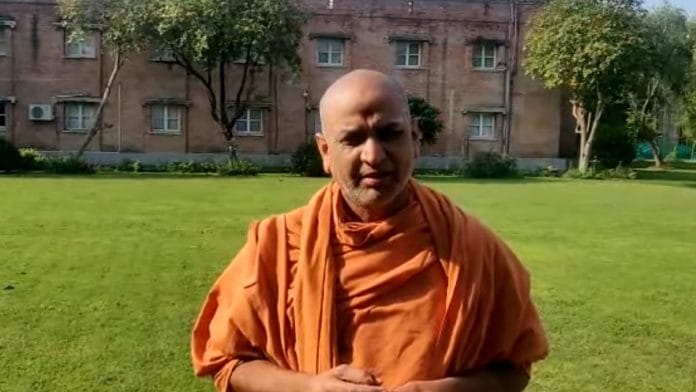New Delhi: The Supreme Court Wednesday refused to interfere with the Karnataka High Court order that upheld an externment order against restrained Adrishya Kadsiddheshwar Swamiji of Kaneri Math, Kolhapur, Maharashtra. This administrative order restrained him from entering Vijaypura district in Karnataka for two months, from 16 October to 14 December.
A bench led by Justice Pankaj Mithal echoed the high court’s sentiment that as a saint the Kaneri Math pontiff should have exercised restraint on the use of language when disagreeing with the opposite faction of the Lingayat community.
“He should have been careful,” the bench said in a brief hearing that took place Wednesday, without going into the merits of the prohibitory order.
However, at the same time, the bench clarified that the externment order, issued by the Vijayapura Deputy Commissioner’s office will not form the basis to restrict the pontiff’s entry in other parts of Karnataka.
The pontiff, it added, can enter Vijayapura on the expiry of the two-month timeline mentioned in the externment order unless there is yet another specific order restricting him.
The bench was hearing Swami Adrushya Kadasiddeshwara’s appeal against Karnataka HC’s 17 October order that declined to quash the externment order.
Issued on 15 October under the directions of Vijayapura District Commissioner, the externment order blamed the pontiff’s statement against the Lingayat pontiffs’ federation for the protests that broke out in several parts of Karnataka, particularly Vijayapura, Bidar, Sindhanur, Kudalasangama, Belagavi and Chittaguppa. While expressing concern over the use of “derogatory” and “obscene” language, the order apprehended that such statements could create “divisions in the name of religion”.
The statements “are not only an affront to religious tolerance, but are also likely to provoke unrest and hatred in society,” the order said.
It also added: “Further, since he has insulted the heads of Lingayat religious institutions, it is likely to enrage followers of the Lingayat faith.”
Based on police inputs, the Vijayapura District Commissioner issued the prohibitory order against the pontiff.
Before the high court, the pontiff assailed the District Commissioner’s order on the ground it curtailed his right to move freely, a constitutional right that can be restricted based on reasonable grounds. However, in this case, the pontiff argued the reasons given to bar him from entering Vijayapura were arbitrary and unreasonable.
However, the high court held that the pontiff had a corresponding duty to ensure that the exercise of right does not endanger peace or public order.
The right to move freely cannot be claimed in isolation, it had said.
“It is no doubt unfortunate that differences have arisen between two revered spiritual leaders, and the petitioner, being a pontiff commanding considerable public following, is expected to exhibit composure, tolerance, and restraint even in the face of provocation,” the high court observed.
It felt that the pontiff’s remarks, made in response to another pontiff, was not a dignified rebuttal, but a degenerated one. The statements, it said, suggested physical assault. The court too took note of the public protests that erupted following the remarks made by the pontiff.
“While this court is informed about the petitioner’s revered stature, it cannot overlook the fact that his utterances have already resulted in public protests and created palpable tension among devotees,” said the high court, backing the preventive measures.
It advised the pontiff to demonstrate spiritual maturity by voluntarily deferring his visit in larger public interest.
Aggrieved, the pontiff moved the top court through advocate Amit Pai. In his appeal, he brought up the second externment order issued against him soon after the Karnataka HC order. This time it was the District Commissioner of Bagalkote. Not only were restrictions imposed on his movement, he was also directed to leave the Mallikarjun Math in Chikkalagundi village of Bilagi taluka where he was residing when the high court order was passed.
According to the pontiff, the externment orders were issued without affording him an opportunity to explain himself. Besides limiting his movement, the order also interfered with a religious ceremony which the pontiff was supposed to attend on 16 and 17 October in Vijayapura.
According to the appeal, the high court had erred in failing to address the issue of “reasonableness” of the restrictions imposed on the pontiff’s fundamental right to move freely.
(Edited by Amrtansh Arora)






